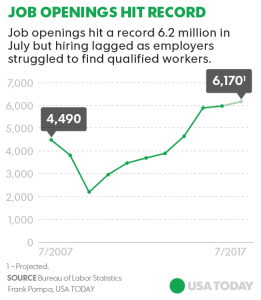No problem!
Many are still surprised to hear that US companies are struggling to find workers in an increasingly tight labor market—and as a result, many are making offers to candidates (white- and blue-collar workers alike) who lack skills or experience considered essential just a few years ago.
“Companies aren’t going for 100% of the job description,” says Paul McDonald, senior executive director of staffing firm Robert Half. “They’re going for approximately 70% to 75% of the job description but they’re going with individuals who have high potential and are a good cultural fit.”
Consider a marketing coordinator who’s a whiz at digital and social media, but who doesn’t write content. Or the aspiring warehouse worker with zero experience on the floor. Or the sales vice president who just left a technology firm and knows little about the consumer product industry she’s applying to enter.
Even large conglomerates seeking top executives are starting to welcome candidates without prior experience at multibillion-dollar, global companies, says Jeanne Branthover, managing partner of DHR International, an executive search firm.
And so to fill the void, a growing number of employers are starting training programs. Nearly half of U.S. employers offered such programs last year to address talent shortages, up from a mere 12% in 2015, according to a survey by staffing firm ManpowerGroup.
Other companies are choosing the candidate who meets most of the desired qualifications, and then bringing on another worker to pick up the rest—effectively splitting the job in two and paying each employee about half the original salary, says Tom Gimbel, CEO of LaSalle Network, a staffing agency in the Chicago area.
But, he notes, while businesses are growing more and more accepting of the fact that certain basic skills can be taught, job candidates must be able to show innate “soft” skills, like the ability to work well with colleagues and deal professionally with customers.
“They’re not going to sacrifice (on job requirements) for somebody who doesn’t have the interpersonal skills,” Gimbel says.
Candidates with some gaps and rough edges are becoming more attractive simply because employers don’t have a choice. With the unemployment rate at a decades-low 4.4%, there are few uncommitted workers to choose from. Last July, there were a record 6.2 million job openings according to the Labor Department. And nearly half of about 2,000 companies said they couldn’t find qualified candidates for their job openings in 2017, up from 41% the previous year (according to a number of CareerBuilder surveys).
The “employees market” is a significant reversal from the years following the Great Recession, when unemployment hovered near 10% and businesses demanded candidates meet 9 or all 10 of the criteria on their checklists.
For example, Del Toro Loan Servicing, in California used to hire customer service representatives with prior experience servicing mortgage loans. But with the hunt for new employees now dragging on for 3 to 4 months (instead of the previous average of about 6 weeks), CEO Drew Louis has waived the requirement. Instead, he’s now targeting job-seekers who might lack relevant experience but who relate well to customers, including those who are delinquent on their mortgage payments.
“They have to have empathy,” he says. “We’re going after a much more available market.”
Louis’s last four hires included a restaurant manager, an administrative assistant, and a stay-at-home mother who was venturing back into the workforce in her late 50s. His firm, which employs 40 workers, supplies the newcomers with training videos to help them learn the basics and then pairs them up with veteran employees so they can shadow those with more experience. Louis says he’s now filling openings in two to four weeks. And even though it takes a few months for the neophytes to become productive, even experienced new hires take some time to get up to speed. Overall, he claims, the process has been trimmed by about a month (even when you factor in the candidate search).
Louis is also saving money since the green employees start at about $30,000, which comes about to only half the salary of skilled new hires. And since many earn substantially more than they did in their previous jobs, “They have an awesome attitude,” he says. Most, he says, are more willing than older hands to proactively call customers just to see if they need anything.
Still, there are plenty of employers who remain unwilling to compromise on qualifications for jobs.
Ravin Gandhi, CEO of GMM Nonstick Coatings of Chicago, whose 300 U.S. employees manufacture coatings for cookware, says the tight labor market has forced him to hire certain managers who have overseen fewer than five employees, for example, instead of an ideal 15 to 20.
But for the position of the chemists, who make coatings, candidates must still meet all of his requirements, including having previous cookware experience. That’s largely because the products need to pass government inspections.
“Someone might make coatings for car mufflers,” Gandhi says. “That person probably isn’t the right person.”





